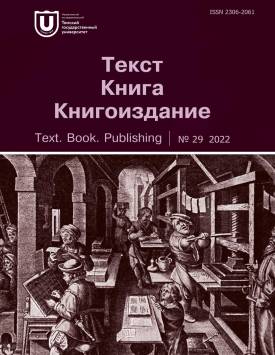The reader-character in Yuri Felzen’s novel Letters about Lermontov
The article examines the plot of reading and interpreting Mikhail Lermontov’s works by the reader-character of the novel Letters about Lermontov (1935) by Yuri Felzen, a writer of the younger generation of Russian emigration. The love conflict of the central character (he is the narrator, the author of letters to his beloved who left him) is overcome by the act of writing and the departure into the world of culture, the value center of which for him is Lermontov. Strategies for reading Lermontov by a writing character are close to the biographical method - no separation of the writer’s life and work, identification of the author with his hero (Pechorin, Demon, poetic lyrical hero). The purpose of learning Lermontov’s personality through his works (diaries, poetry, poems, the novel Hero of Our Time, etc.) is to find an existential landmark (perseverance and courage before the blows of fate) and an aesthetic principle (patience and sincerity in creative work). In self-identification with Lermontov-Pechorin, an act of self-knowledge, recognition of inconsistency with the ideal, and behavioral self-correction take place. The second line of letters about Lermontov is the formulation of the essence of literary creativity, the author’s version of the history of Russian literature and its fate in the modern world. According to the character of the novel, classical literature in the twentieth century becomes incomprehensible and unable to agitate, but, dying, it conveys its artistic discoveries to modern literature, which means that art continues to develop. Lermontov is the connecting link: he is a writer of the 19th century, but his works remain modern, because they were ahead of their time. Lermontov, according to the narrator-character, stands above Pushkin, he is the forerunner of Tolstoy and Proust, i.e., the literature of modernism that is capable of showing an incomplete world and a contradictory person, to which the central character of the novel aspires. Art in the author’s concept, as exemplified by Lermontov, is an act of self-knowledge necessary for the artist himself, but allowing one to go from observing about oneself to generalizing about human nature. Reading is the cognition of the Other and their way of being, it is approaching to the understanding of reality; reading is also the threshold for creating a text, one’s own way of being, built in dialogue with world literature. Felzen’s article “Lermontov in Russian Literature” (1938) is not development, but a concentrate of novel ideas. In critical discourse, Felzen evaluates Lermontov less categorically: he is equal to Pushkin in the sense of proportion, freedom from politics and religion. Felzen concludes: after the death of Lermontov, Russian literature was not free from the power of political and religious ideas (Gogol, Tyutchev, Tolstoy, Dostoevsky). The author declares no conflicts of interests.
Keywords
Yuri Felzen, Mikhail Lermontov, Letters about Lermontov, reader-character, epistolary novelAuthors
| Name | Organization | |
| Nazarenko Ivan I. | Tomsk State University | nazarenko42@yandex.ru |
References

The reader-character in Yuri Felzen’s novel Letters about Lermontov | Tekst. Kniga. Knigoizdanie - Text. Book. Publishing. 2022. № 29. DOI: 10.17223/23062061/29/2
